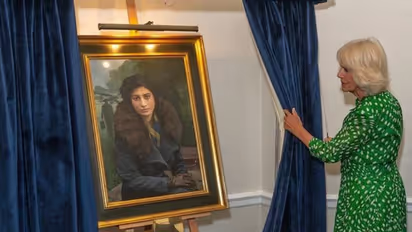Who was Noor Inayat Khan, the Indian-origin spy honoured by Britain's Queen Camilla?

Synopsis
Noor Inayat Khan was a British spy of Indian and American descent, known for her brave contributions during World War II. She served as a wireless radio operator and secret agent for the Special Operations Executive (SOE), which was responsible for espionage and sabotage activities against Nazi Germany and its allies.
Queen Camilla of Britain revealed a new portrait of Noor Inayat Khan, an Indian-origin spy and descendant of Tipu Sultan, during a ceremony at the Royal Air Force (RAF) Club. The purpose of this unveiling was to commemorate Noor's courageous role as an undercover agent for Britain's Special Operations Executive (SOE) during World War II.
In addition to this, the 76-year-old royal also officially designated a room at the RAF Club as the 'Noor Inayat Khan Room'. This room now houses the aforementioned portrait, and it is located opposite a stained-glass window dedicated to honouring women in the RAF, which was originally inaugurated by her late mother-in-law, Queen Elizabeth II, in 2018.
The unveiling of the portrait at the RAF Club took place in the presence of Noor Inayat Khan's relatives, among whom was her 95-year-old cousin, Shaikh Mahmood, and her nephew, Pir Zia Inayat Khan.
Established in 1918, the RAF Club is a private Members' Club and registered charity that serves as a welcoming haven for officers of the Royal Air Force (RAF) and their families, offering them a home away from home. The Club boasts a membership of approximately 24,000 Officers, including former serving officers of the Royal Air Force and their families.
Let us take a look at who Noor Inayat Khan was
Date of Birth: January 1, 1914
Date of Death: September 13, 1944
Nationality: British (of Indian and American descent)
Occupation: Special Operations Executive (SOE) Agent, Radio Operator, Spy
Noor Inayat Khan was a remarkable British spy and war heroine of Indian and American descent, known for her brave contributions during World War II. She served as a wireless radio operator and secret agent for the Special Operations Executive (SOE), an organization responsible for espionage and sabotage activities against Nazi Germany and its allies.
Early Life and Background
Noor Inayat Khan was born in Moscow, Russia, to an Indian father, Hazrat Inayat Khan, who was a Sufi musician and teacher, and an American mother, Ora Ray Baker. The family moved frequently, and Noor spent her early years in various countries, including France and England. Her upbringing was deeply influenced by her father's spiritual teachings, emphasizing principles of nonviolence, tolerance, and harmony.
War Efforts and Espionage
As World War II erupted, Noor Inayat Khan felt compelled to contribute to the Allied war effort against Nazi Germany. Despite her pacifist upbringing, she chose to enlist as a wireless radio operator for the SOE, a decision that aligned with her belief in defending freedom and justice.
In 1942, Noor was trained extensively in espionage, communication, and guerrilla warfare techniques at various SOE training schools, including the Wanborough Manor and the Beaulieu Palace in England. She demonstrated exceptional determination, linguistic skills (speaking English, French, and German), and technological aptitude, making her an invaluable asset for covert operations.
Behind Enemy Lines
Noor was parachuted into occupied France in June 1943 under the codename "Madeleine." Operating undercover as a radio operator, she established communication lines between the French Resistance and the Allied forces in England. Her ability to maintain secure radio transmissions while evading detection was vital to the success of resistance activities.
Capture and Sacrifice
Tragically, Noor's cover was compromised, and she was arrested by the Gestapo in October 1943. Despite being subjected to harsh interrogation and torture, she remained steadfast in her commitment to protecting her fellow agents and refused to reveal crucial information. She made several escape attempts but was ultimately imprisoned in Pforzheim prison in Germany.
On September 13, 1944, Noor Inayat Khan was executed at the Dachau concentration camp, making the ultimate sacrifice for her ideals and dedication to the Allied cause. Her courage, resilience, and determination in the face of extreme adversity became emblematic of the sacrifices made by countless individuals during the war.
Legacy and Recognition
Noor Inayat Khan's bravery and sacrifice have been widely recognized and honoured. She was posthumously awarded the George Cross, the highest civilian award for bravery in the United Kingdom, as well as the Croix de Guerre by the French government. Her life story continues to inspire people around the world, highlighting the significant contributions of women and individuals from diverse backgrounds in the fight against tyranny and oppression.
Noor Inayat Khan's story serves as a testament to the power of conviction, courage, and the enduring spirit of resistance against injustice, making her an enduring symbol of heroism during World War II.
Stay updated with the Breaking News Today and Latest News from across India and around the world. Get real-time updates, in-depth analysis, and comprehensive coverage of India News, World News, Indian Defence News, Kerala News, and Karnataka News. From politics to current affairs, follow every major story as it unfolds. Get real-time updates from IMD on major cities weather forecasts, including Rain alerts, Cyclone warnings, and temperature trends. Download the Asianet News Official App from the Android Play Store and iPhone App Store for accurate and timely news updates anytime, anywhere.